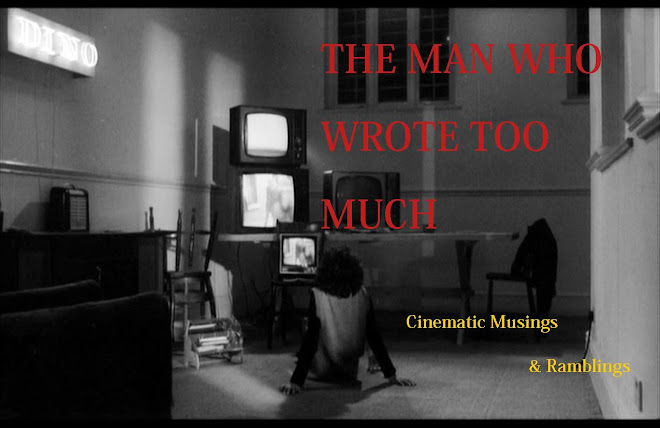Udo Kier reins himself in considerably after his frenzied Dr. Frankenstein. Here he appears as an anaemic Dracula, the vampire of strung out heroin chic rather than charismatic sexual predator. From the film’s opening onwards he is painted as a tragic character, all melancholy and malaise, a character tired of his centuries of increasingly desperate existence. We watch as he uses make-up to disguise his aging features, methodically applying lipstick and dye to his hair in front of a mirror in which he can’t even see the results. The film humorously chooses to play fast and loose with Stoker’s rule set though, the usual cross/daylight cliches just serve as minor irritants in Morrissey’s rendition.
+1.JPG)
The film centres on Dracula’s need to leave his native Romania where he has exhausted the local populace of remaining “wirgins”. He travels with his assistant to Italy where it is presumed local catholic dogma will mean a surplus of virginal women; they manage to convince the desperate faded aristocracy that is the Di Fiore family to take them in. Unfortunately for Dracula, some of the four supposedly virginal daughters of the family have been attending secret liaisons with the family groundskeeper, an aspirant Marxist revolutionary played by Morrissey standard and Greek adonis for the pop art generation that is Joe Dallesandro.
The film riffs repeatedly on the fading of traditional class boundaries and religion, it’s no accident that the film is set during the decadent years of the 1920’s as societal structures morphed and the potential virtues of communism looked like they might just possibly change the world.
+2.JPG)
This still being a Morrissey/Kier film though, the film does not aim for anything too profound and refuses to take itself seriously. Hilarity is often provided purely by virtue of the ridiculous variety of accents on show, throwing the balance of the film wildly off kilter. Whilst the immaculate sets provoke images of thespian dramatics, we are provided with Kier and his thickly accented German, Dallesandro who despite being cast as a European peasant Marxist still plays the role as a swaggering 42nd street hustler. Dracula’s assistant Anton (Arno Juerging) plays like a cousin to Joseph Goebbels. Lady Di Fiore (Maxime McKendry) comes across as Margaret Thatcher’s slightly more elegant sister, whilst Il Marchese DI Fiore is played by Neo-Realism legend Vittorio Di Sica (yes the same one who directed The Bicycle Thieves) of all people, and he gamely fights a losing battle with the English language, as do most of the daughters (Also look out for a humorous cameo from Roman Polanski, who again proves his comedy chops).
Like the previous Flesh for Frankenstein, most of the intentional humour is of the blackest possible variety. Dracula’s recurring vomiting of ‘tainted’ blood set to the strains of a classical score, and the wild and delirious grand guignol of the closing five minutes of the film being typical of the contorted sense of humour.
+3.JPG)
Overall it’s hard to call the film a classic, its cult status is tarnished by its lack of frequent re-watchability, and as funny as the stilted first take style of acting is, this does tend to make the film drag on for longer than it should. Morrissey also can’t help but let the film descend into occasional bouts of Jess Franco style euro soft-core, with Dallesandro’s character’s penchant for casual rape as the answer to the vampire problem also being somewhat... well ... questionable...
Certainly though the film is worth at least one trip, it’s not without redeeming features and a back to back evening with... yes you guessed it Flesh for Frankenstein, will provide a night of twisted and perversely entertaining takes on the Universal classics.

hell yeah
ReplyDeleteyour conclusion are right men, this movie cannot have the honorable title of classic, the movie not have the enough power to be a horror movie like others.
ReplyDelete